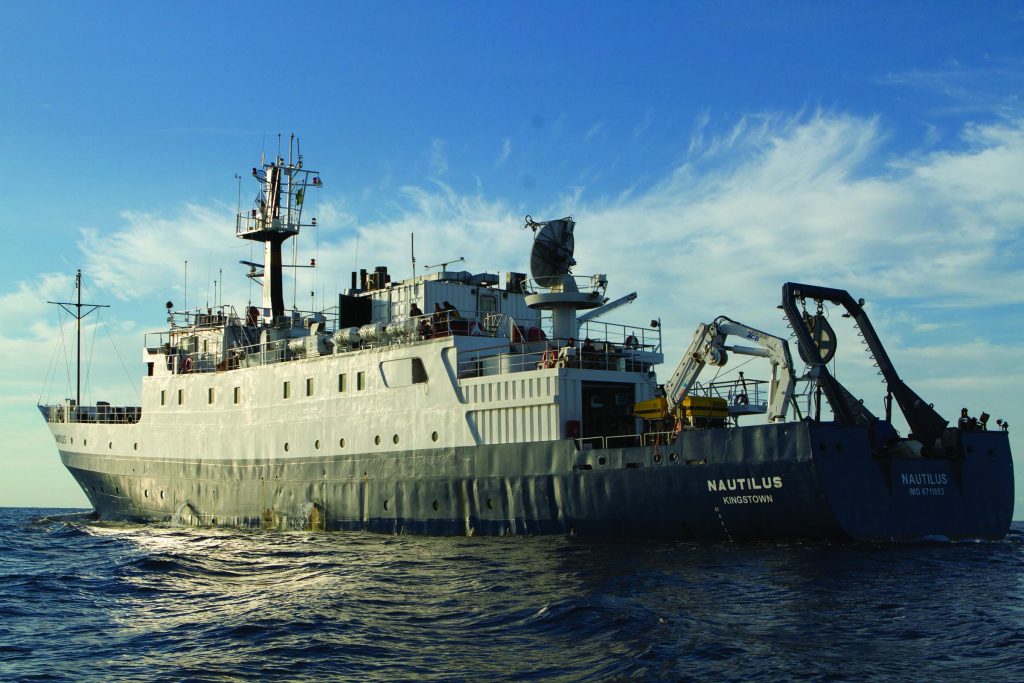Ocean exploration vital to Tri-Counties

The Nautilus is mapping the sea floor around the Channel Islands for the Ocean Exploration Trust.
By Melissa Baffa
As I write this, the exploration vessel Nautilus is “mowing the lawn,” proceeding back and forth in an orderly march around the Channel Islands, mapping the sea floor.
Owned by the Ocean Exploration Trust, an organization founded by Robert Ballard in 2008, the Nautilus is taking a journey through our collective back yard this summer. Exploration like this helps to answer key questions about our ocean, which is vitally important across many sectors in the Tri-Counties.
Beyond the fact that 71 percent of our planet’s surface is under water, and that the sea and our weather are intimately connected, there are many reasons why this expedition, and ocean exploration in general, is applicable and important to each of us.
• Resources: Significant oil and gas deposits lie off our coast and we have a substantial economic stake in this industry locally. In addition to fossil fuels, other resources, such as metals, are found in large deposits on the ocean floor. In fact, the hydrothermal vents that we’ve explored with the Nautilus discharge metals, as do vents around the globe.
Understanding the geologic processes behind these phenomena helps us to potentially harvest these resources from the sea and to locate similar deposits on land.
• Biological measurements and baselines: Conservationists and fishermen alike are concerned about the number and diversity of species in the ocean. Without baseline measurements, we cannot effectively compare populations over time. Staff in marine protected areas are especially interested in tracking populations over time, in order to show the effect of their protected zones on ocean denizens.
A recent example of why baseline measurements are important lies in the 2015 oil spill at Refugio State Beach. Without knowing what was there before, it is difficult to assess the extent of the damage done by the oil, as well as the dispersants and physical methods used to clean up the spill.
• Faults and other seismic features: By mapping and exploring the ocean, we can identify the faults, undersea volcanoes and other active geologic features that pose a hazard. Earthquakes, tsunamis and volcanic eruptions are some of the risks of living in the Pacific “Ring of Fire.” Knowing more about what lurks beneath the ocean will help us to be better prepared for future disasters.
• Medicine and technology: Many of our drugs and scientific techniques are connected with ocean exploration. From compounds derived from the tissues of deep-sea creatures used to treat human ailments, to proteins vital to the replication of DNA in a lab setting, to new technologies for cleaning up hazardous materials, the sea’s secrets have been tapped time and time again to help solve the needs of medicine, industry and science.
• Change in the world’s oceans: Significant long-term transformation is predicted in most climate change models. This includes not only an increase in temperature at the sea surface but also the disruption of the normal flow of currents, acidification of the ocean and the associated effects on ocean communities, such as the coral bleaching being documented worldwide.
California’s kelp communities rely on cold water. Disruption of ocean currents and an increase in water temperature would be disastrous to our kelp and, in turn, disastrous for the organisms in those habitats and for our coastline during storms, as kelp helps to absorb the impact of ocean waves. It is important that we understand how these complex systems work, and that we document our conditions now, in order to accurately measure the degree of change in each scenario.
• Shipping: The Port of Hueneme is an economic powerhouse for our region and part of its unique appeal as a port is a massive underwater canyon that intersects its location along the coast. Mapping and exploring our underwater realm will help us to understand how to best conduct shipping in our region, thus keeping this underpinning of our economy moving smoothly.
• Security: Ocean provides great cover. Our coastline knows this story well. The 1942 bombing of the Ellwood Oil Field near Goleta by a Japanese submarine prompted significant efforts to protect our communities and resources in the Tri-Counties. A great amount of the funding that has been historically provided for ocean research has, directly or indirectly, been connected with issues of national security and assuring our military prowess.
We must know the bathymetry off our coasts in order to understand the ways we could be vulnerable to attack from the sea, especially important when we consider that both Naval Base Ventura County and Vandenberg Air Force Base lie, along with a number of other attractive targets, within the Tri-Counties region.
This is only a snapshot of why ocean exploration is important, now and in the future. In addition to these reasons, inspiring the next generation of STEM professionals is a key component of the mission of the Nautilus exploration program.
That inspiration may occur through telepresence, which allows you to engage in ocean exploration live from the comfort of your computer or web-enabled device. To participate in ocean exploration off the coast of California this summer, go to the Nautilus Live website at www.nautiluslive.org
• Melissa Baffa is a science communication fellow with the Ocean Exploration Trust.











